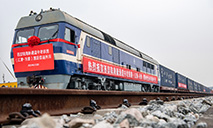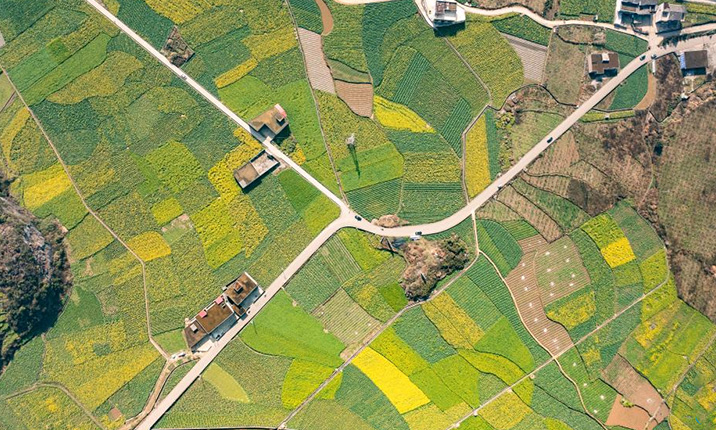Pic story: inheritor of intangible cultural heritage of hemp weaving in Ningxia
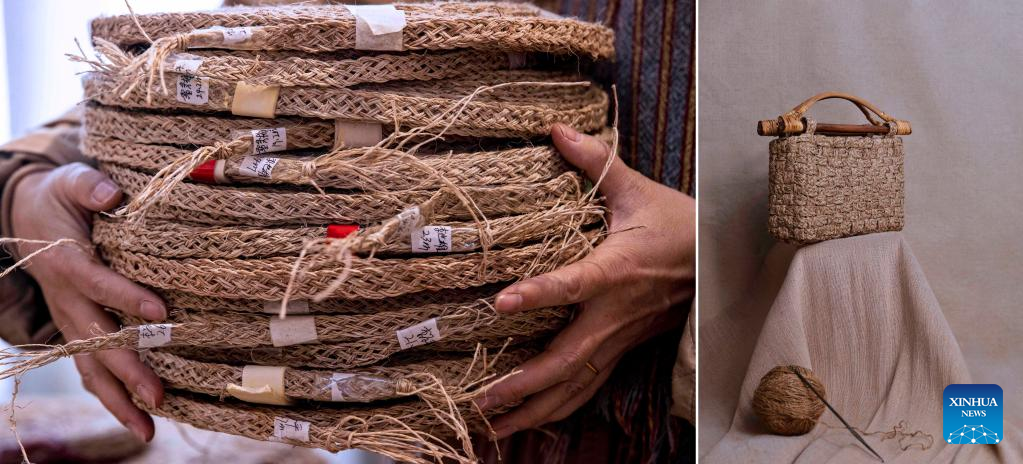
In this combo photo, the left part taken by Yang Zhisen on March 4, 2022 shows the hemp products made by villagers, in Yueyahu Township, Yinchuan, capital of northwest China's Ningxia Hui Autonomous Region; and the right part provided by the interviewee shows a bag made by Zhang Jing. Zhang Jing, an inheritor of intangible cultural heritage of hemp weaving, came to Yueyahu Township at the end of 2017, and set up a training class and a hemp weaving workshop here. Most of the trainees are women, with the youngest 26 years old and the oldest over 70.
In the past few years, Zhang Jing has been traveling between downtown Yinchuan and Yueyahu, teaching skills and sending raw materials to villagers, and bringing back rough-wrought products for post-processing. With these rough-wrought products, she designed daily necessities such as hand bags, storage baskets and key rings, and cultural and creative products combining cultural elements of Ningxia.
By learning weaving skills, women of Yueyahu not only mastered a skill of craft, but also obtained stronger belief of self-reliance. "Spiritual and cultural satisfaction is more valuable than economic benefits." Zhang Jing said. (Xinhua)

A villager weaves a hemp bag in Yueyahu Township, Yinchuan, capital of northwest China's Ningxia Hui Autonomous Region, March 4, 2022. Zhang Jing, an inheritor of intangible cultural heritage of hemp weaving, came to Yueyahu Township at the end of 2017, and set up a training class and a hemp weaving workshop here. Most of the trainees are women, with the youngest 26 years old and the oldest over 70.
In the past few years, Zhang Jing has been traveling between downtown Yinchuan and Yueyahu, teaching skills and sending raw materials to villagers, and bringing back rough-wrought products for post-processing. With these rough-wrought products, she designed daily necessities such as hand bags, storage baskets and key rings, and cultural and creative products combining cultural elements of Ningxia.
By learning weaving skills, women of Yueyahu not only mastered a skill of craft, but also obtained stronger belief of self-reliance. "Spiritual and cultural satisfaction is more valuable than economic benefits." Zhang Jing said. (Xinhua/Yang Zhisen)

Aerial photo taken on March 4, 2022 shows a view of a village in Yueyahu Township, Yinchuan, capital of northwest China's Ningxia Hui Autonomous Region. Zhang Jing, an inheritor of intangible cultural heritage of hemp weaving, came to Yueyahu Township at the end of 2017, and set up a training class and a hemp weaving workshop here. Most of the trainees are women, with the youngest 26 years old and the oldest over 70.
In the past few years, Zhang Jing has been traveling between downtown Yinchuan and Yueyahu, teaching skills and sending raw materials to villagers, and bringing back rough-wrought products for post-processing. With these rough-wrought products, she designed daily necessities such as hand bags, storage baskets and key rings, and cultural and creative products combining cultural elements of Ningxia.
By learning weaving skills, women of Yueyahu not only mastered a skill of craft, but also obtained stronger belief of self-reliance. "Spiritual and cultural satisfaction is more valuable than economic benefits." Zhang Jing said. (Xinhua/Yang Zhisen)
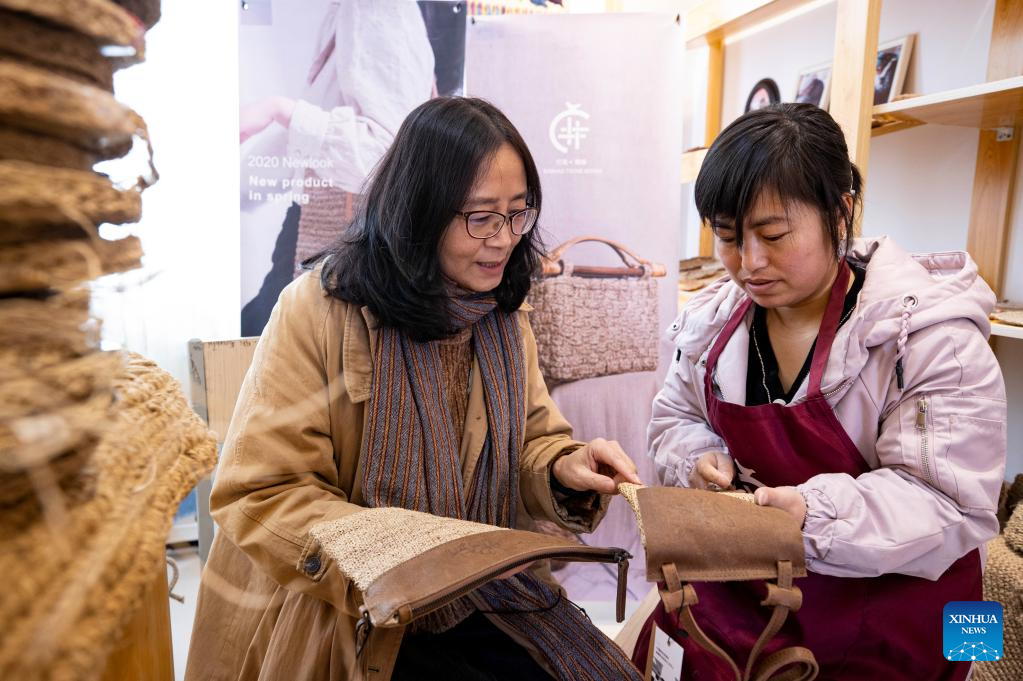
Zhang Jing (L) teaches the skills of hemp weaving to a villager in Yueyahu Township, Yinchuan, capital of northwest China's Ningxia Hui Autonomous Region, March 4, 2022. Zhang Jing, an inheritor of intangible cultural heritage of hemp weaving, came to Yueyahu Township at the end of 2017, and set up a training class and a hemp weaving workshop here. Most of the trainees are women, with the youngest 26 years old and the oldest over 70.
In the past few years, Zhang Jing has been traveling between downtown Yinchuan and Yueyahu, teaching skills and sending raw materials to villagers, and bringing back rough-wrought products for post-processing. With these rough-wrought products, she designed daily necessities such as hand bags, storage baskets and key rings, and cultural and creative products combining cultural elements of Ningxia.
By learning weaving skills, women of Yueyahu not only mastered a skill of craft, but also obtained stronger belief of self-reliance. "Spiritual and cultural satisfaction is more valuable than economic benefits." Zhang Jing said. (Xinhua/Yang Zhisen)
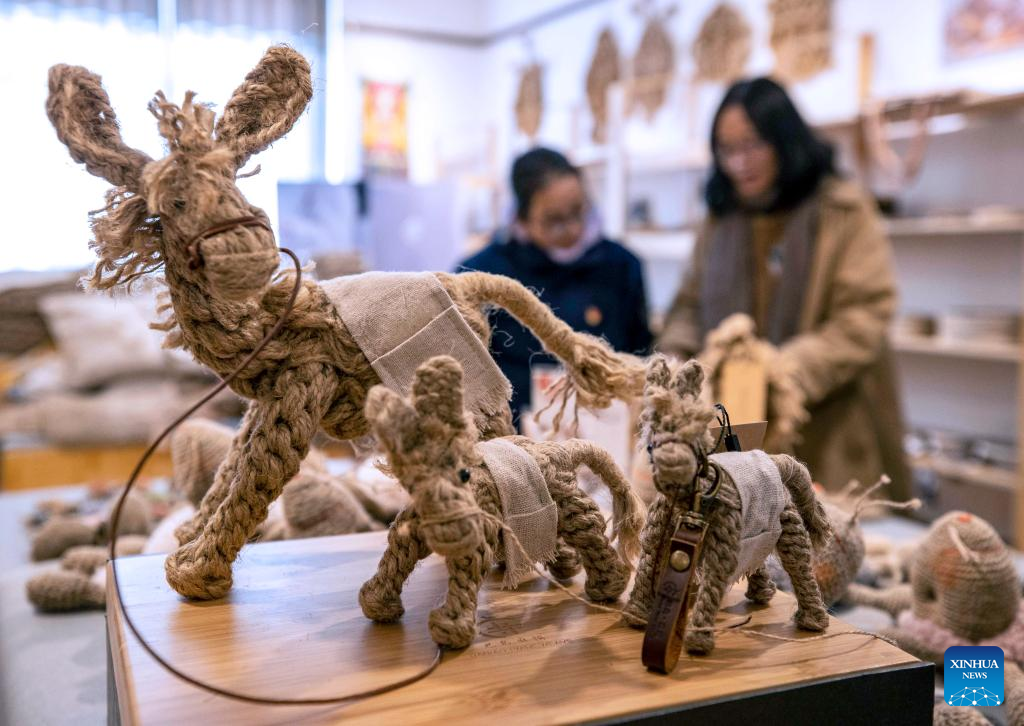
Photo taken on March 4, 2022 shows the hemp weaving products displayed at the hemp weaving workshop in Yueyahu Township, Yinchuan, capital of northwest China's Ningxia Hui Autonomous Region. Zhang Jing, an inheritor of intangible cultural heritage of hemp weaving, came to Yueyahu Township at the end of 2017, and set up a training class and a hemp weaving workshop here. Most of the trainees are women, with the youngest 26 years old and the oldest over 70.
In the past few years, Zhang Jing has been traveling between downtown Yinchuan and Yueyahu, teaching skills and sending raw materials to villagers, and bringing back rough-wrought products for post-processing. With these rough-wrought products, she designed daily necessities such as hand bags, storage baskets and key rings, and cultural and creative products combining cultural elements of Ningxia.
By learning weaving skills, women of Yueyahu not only mastered a skill of craft, but also obtained stronger belief of self-reliance. "Spiritual and cultural satisfaction is more valuable than economic benefits." Zhang Jing said. (Xinhua/Yang Zhisen)
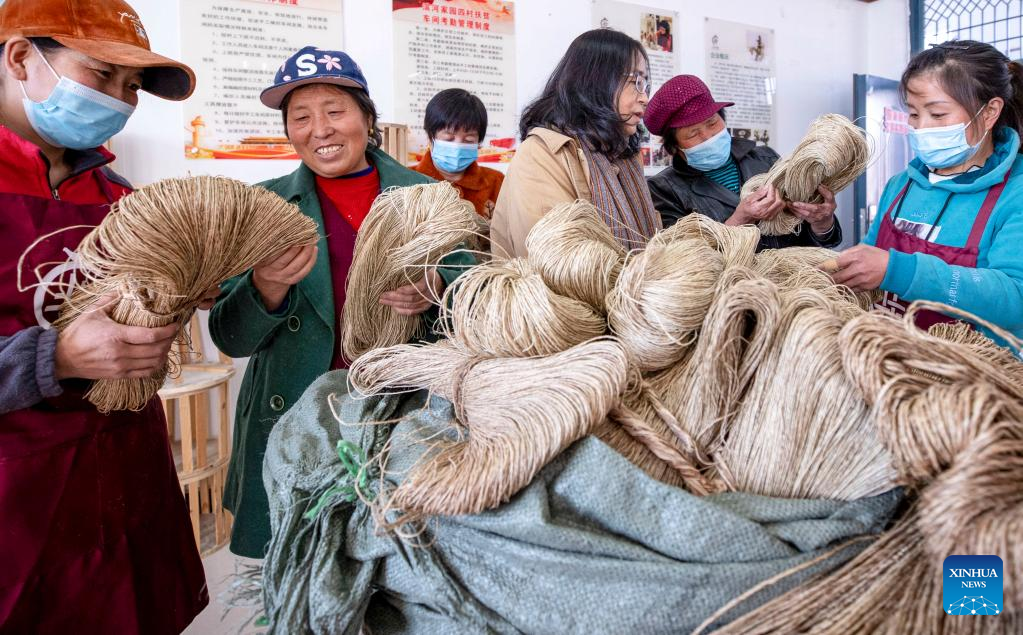
Villagers select the raw material of hemp weaving in Yueyahu Township, Yinchuan, capital of northwest China's Ningxia Hui Autonomous Region, March 4, 2022. Zhang Jing, an inheritor of intangible cultural heritage of hemp weaving, came to Yueyahu Township at the end of 2017, and set up a training class and a hemp weaving workshop here. Most of the trainees are women, with the youngest 26 years old and the oldest over 70.
In the past few years, Zhang Jing has been traveling between downtown Yinchuan and Yueyahu, teaching skills and sending raw materials to villagers, and bringing back rough-wrought products for post-processing. With these rough-wrought products, she designed daily necessities such as hand bags, storage baskets and key rings, and cultural and creative products combining cultural elements of Ningxia.
By learning weaving skills, women of Yueyahu not only mastered a skill of craft, but also obtained stronger belief of self-reliance. "Spiritual and cultural satisfaction is more valuable than economic benefits." Zhang Jing said. (Xinhua/Yang Zhisen)
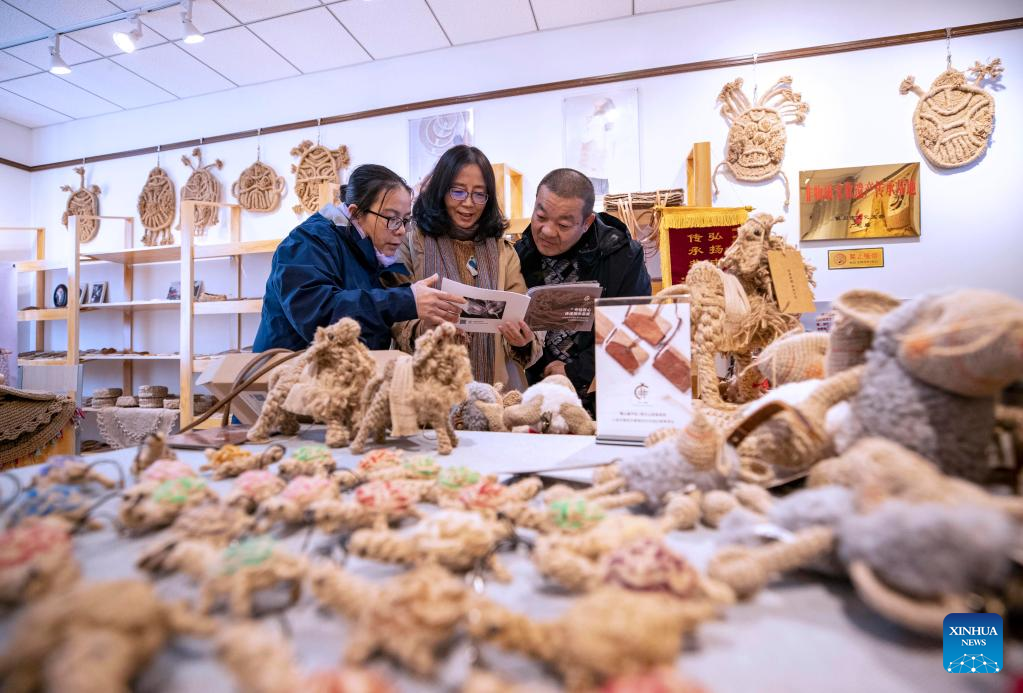
Zhang Jing (C) introduces hemp weaving to tourists in Yueyahu Township, Yinchuan, capital of northwest China's Ningxia Hui Autonomous Region, March 4, 2022. Zhang Jing, an inheritor of intangible cultural heritage of hemp weaving, came to Yueyahu Township at the end of 2017, and set up a training class and a hemp weaving workshop here. Most of the trainees are women, with the youngest 26 years old and the oldest over 70.
In the past few years, Zhang Jing has been traveling between downtown Yinchuan and Yueyahu, teaching skills and sending raw materials to villagers, and bringing back rough-wrought products for post-processing. With these rough-wrought products, she designed daily necessities such as hand bags, storage baskets and key rings, and cultural and creative products combining cultural elements of Ningxia.
By learning weaving skills, women of Yueyahu not only mastered a skill of craft, but also obtained stronger belief of self-reliance. "Spiritual and cultural satisfaction is more valuable than economic benefits." Zhang Jing said. (Xinhua/Yang Zhisen)
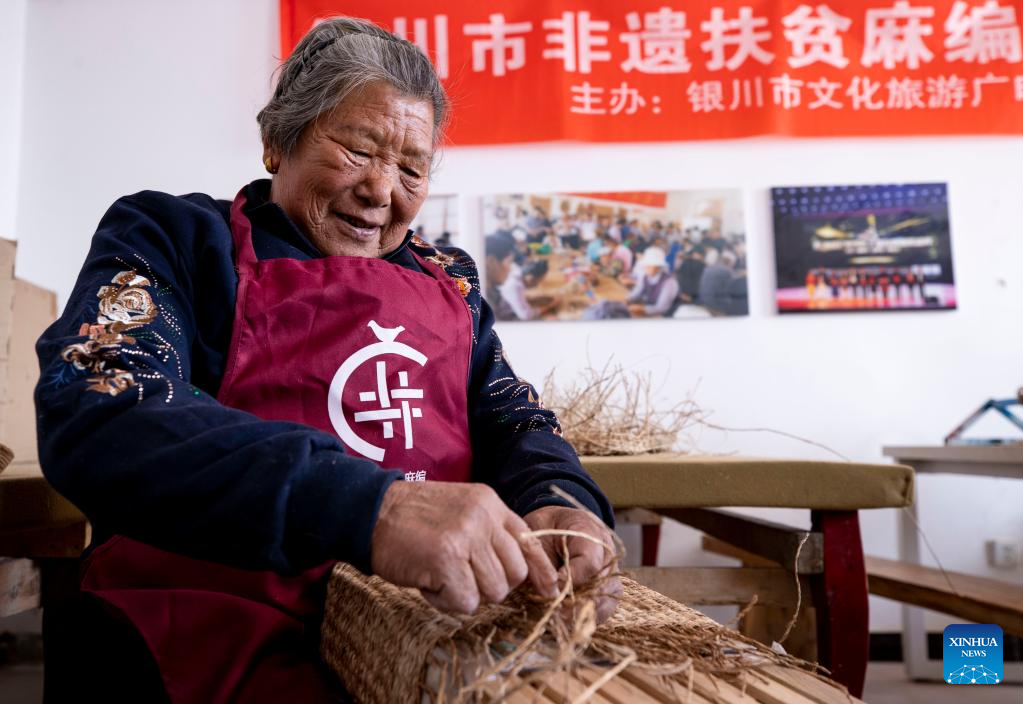
A villager weaves a hemp bag in Yueyahu Township, Yinchuan, capital of northwest China's Ningxia Hui Autonomous Region, March 4, 2022. Zhang Jing, an inheritor of intangible cultural heritage of hemp weaving, came to Yueyahu Township at the end of 2017, and set up a training class and a hemp weaving workshop here. Most of the trainees are women, with the youngest 26 years old and the oldest over 70.
In the past few years, Zhang Jing has been traveling between downtown Yinchuan and Yueyahu, teaching skills and sending raw materials to villagers, and bringing back rough-wrought products for post-processing. With these rough-wrought products, she designed daily necessities such as hand bags, storage baskets and key rings, and cultural and creative products combining cultural elements of Ningxia.
By learning weaving skills, women of Yueyahu not only mastered a skill of craft, but also obtained stronger belief of self-reliance. "Spiritual and cultural satisfaction is more valuable than economic benefits." Zhang Jing said. (Xinhua/Yang Zhisen)

Zhang Jing (C front) checks the hemp weaving products made by the villagers in Yueyahu Township, Yinchuan, capital of northwest China's Ningxia Hui Autonomous Region, March 4, 2022. Zhang Jing, an inheritor of intangible cultural heritage of hemp weaving, came to Yueyahu Township at the end of 2017, and set up a training class and a hemp weaving workshop here. Most of the trainees are women, with the youngest 26 years old and the oldest over 70.
In the past few years, Zhang Jing has been traveling between downtown Yinchuan and Yueyahu, teaching skills and sending raw materials to villagers, and bringing back rough-wrought products for post-processing. With these rough-wrought products, she designed daily necessities such as hand bags, storage baskets and key rings, and cultural and creative products combining cultural elements of Ningxia.
By learning weaving skills, women of Yueyahu not only mastered a skill of craft, but also obtained stronger belief of self-reliance. "Spiritual and cultural satisfaction is more valuable than economic benefits." Zhang Jing said. (Xinhua/Yang Zhisen)
Photos
Related Stories
Copyright © 2022 People's Daily Online. All Rights Reserved.







